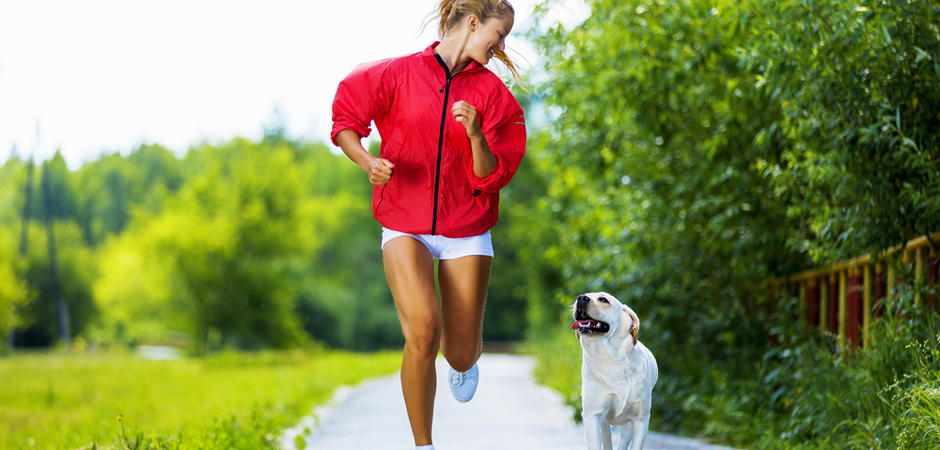We all long for health, fitness, and vitality and many of us made New Year resolutions to work on that. We buy fancy new exercise shoes and high dollar attire to wear while walking on “top of the line” treadmills. We eat foods that we have trouble pronouncing and can’t quite afford because the health food magazines recommend it. Somehow it all falls by the wayside and we feel we will never attain our goal. Yet the one thing that won’t cost us a penny we don’t often consider to best motivate us – our dogs.
Our loyal, lovable, even-tempered furry best friends not only are motivated to exercise, but see exercise as a reward. Imagine that. The new shoes that quickly get dirty, and the health diet that inevitably gets broken, doesn’t compare to your dog holding its leash in its mouth reminding you that twenty minutes outside will make both of you feel better.
While making exercise continually healthy and rewarding for your pet may not mean they need motivation, it does mean a handful of easy steps to ensure your exercise buddy doesn’t have to hang up the leash for too long.
Consult a vet: Just like people should consult physicians before beginning an exercise program, a vet should evaluate dogs to make sure the exercise your planning will be safe for them.
Consider the bread: Check to see if your pet is the right breed for the type of exercise you’re planning to do. Different breeds have greatly varied physical strengths, and it’s important not to assume just because your dog is a larger breed they’ll enjoy the type of endurance exercise you’re looking to do.
Build up gradually: Men’s Health advises to remember dogs build endurance like people do, and starting out your dog on a five mile run might not only exhaust them, but might cause injury. Instead, start by exercising with them a couple miles a few times a week, gradually increasing until your dog’s endurance is inline with your workout routine.
Don’t ignore signs of discomfort: Cesar Milan, “The Dog Whisper”, says to look for signs of exhaustion and pain in your dog. If your pet is panting excessively or slows down abnormally it may not only be time to stop for the day, but you may also want to consider giving your dog a couple extra days to rest until signs of normal energy are present again.
Remember safety: The Dog Whisperer also warns to keep your dog to the side of you to avoid tripping or, if you’re on a bike, a crash for both you and your dog. It’s also important to find a leash belt for certain types of exercise, as a leash around your wrist can injury either you or your dog if there’s a sudden unexpected jerk. For a bike, you can use a device that fastens your dog’s leash to the bike and has a special spring that absorbs the force of your dog’s tug. Finally, don’t forget water – if you need it, so does your dog!
Mind your manners: Though you may love your dog, everyone else on the trail may not. Runners World discusses the importance of remembering to keep your dog on a leash, being the pack leader, pulling off to the side with your dog when people come by, and by all means, picking up your dogs poop. No one wants to do it for you, or worse, step on it.
Routine checks: Along with routine check-ups with your dog’s vet, routinely check your dog for injury by observing their movement and behavior, and always wipe their paws after a workout, ensuring there are no cuts, scraps, or pieces of rock embedded in their paws.
Ensuring the health of your dog will give you a dedicated exercise partner and will give both of you a happy and healthier life. Not only will a dog boast your workouts and enhance your motivation, your dog’s infectious joy for exercise will remind you why exercise is good for your heart in more ways than one.





3 Comments
I absolutely love walking with my dogs. They are great for accountability because they will drive me nuts until they get to go for a nice walk. Just as good as human walking buddys, even better because they don’t talk constantly!
Hi there,
My golden retriever is a great exercise buddy particularly due to the fact that he’s so outgoing and is not considered to be a house dog. He gets really antsy when he’s not let out every other day, so I’ve been able to squeeze in some moderate amounts of exercise thanks to his insatiable energy. Quick tip though: some breeds are exclusively search dogs, and may keep you going for hours if they get a hold of a particular scent. Great blog!
Alana
Briards are herding dogs. They are not at all hyper, but they do need daily exercise. I bought a dog treadmill, but she won’t use it. The WoofStick works well and she enjoys it. It looks like a giant cat toy — a pole, a rope with the plush toy attached with Velcro. It’s great for playing in small spaces. http://www.briard-adventures.com/2012/12/the-woof-stick.html. I am not in any way associated with this product. I just think it’s a good find.